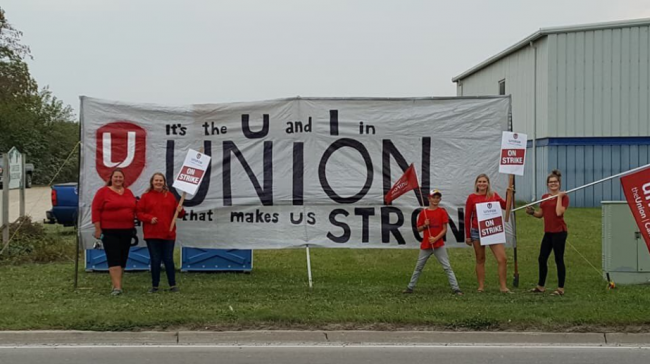The clock is ticking for both sides involved in the autoworkers strike at the CAMI plant in Ingersoll, Ont.

As pickets line up for their fourth day of the strike, the union representing the workers has formally contacted General Motors Canada in hopes of returning to the bargaining table. They want their members to get back to work as soon as possible, but officials say they will not back down until the company commits to product investment for the plant.
On the other hand, GM has its own reasons for wanting to make this a short-term work stoppage: its customers.
“We have a lot of choice in our market right now, especially in this hot segment, the Equinox sells very well. If you go out and you need a car today and you can’t get exactly what you want at your Chevy dealer, you’re going to go to Ford, or Nissan, or Toyota to find what you need.”

Get breaking National news
Nearly 3,000 autoworkers walked off the job late Sunday night after Unifor Local 88 and GM were unable to reach an agreement.
Although officials say progress has been made, they also say both sides have failed to find common ground on major issues.
The union is fighting for more money and job security, and is asking for contract language that makes the CAMI plant a lead producer of the Chevrolet Equinox.
Asked in what other ways companies may try to ensure job security, Dziczek says they can offer certain protections but adds a lot of that changed after the last recession.
CAMI workers have been working mandatory six-days-a-week overtime for the last seven years.
Last month, workers voted 99.8 per cent in favour of striking if a new deal wasn’t reached.
Dziczek says it could be six weeks before supply issues start showing up on lots, and adds the length of a strike usually defines how significant it is.
“It’s been a long time since we’ve seen an individual plant labour action like this, and we’re looking North America-wide. This is not high on the radar screen of most auto analysts right now. Most labour actions have been fairly short term. In the last decade, nobody has walked out for more than a few days, or a few hours in some cases. It depends on how long this goes on,” said Dziczek.
The automotive factory opened in 1989. Its last major strike, which lasted five weeks, was in 1992.
The last contract talks, in September 2013, ended with 89 per cent of workers approving a four-year pact that extended benefits and other full-time perks to about 300 people who had been contract workers.












Comments